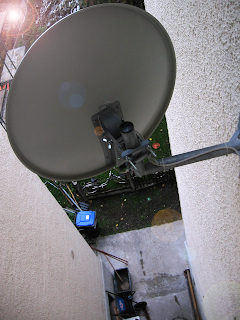Susi’s father, Klaus, spent a long time dying. Where an average person would’ve lasted a fortnight, he, such was his lust for life, hung on to the bitter end and managed to last five weeks in the hospice. He, was Susi assured me, not terribly keen on fuss, on people making a show of him and so it was no surprise when he decided to leave this world early in the morning of Sunday, August 17th. Even though, the hospice had called and Mary Lou had told us that the signs were not good and we should come early, Susi and I were discussing which books we should have brought as we walked into through the grounds in what was already 24° C of summer heat-wave.
In the corridor of the hospice, outside his room, we could clearly see that a small table had appeared with a vase of flowers and a solid red candle burning bright enough to splash the walls with flickering yellow.
“That’s not a good sign,” I said, thinking out loud deliberately, in the absence of having any purposeful thing to say. If Susi said anything at that point, and I’m sure she did, I just can’t remember it. Three days earlier, I had remarked that Klaus had about another stone to go and there followed a short discussion as to why the Brits measure things in stones and the Americans measure things in pounds. It was, I observed, for a Brit, hard to visualise pounds but we reached agreement that there was really on seven kilos left before Klaus simply ran out of steam. This matter of fact-ness may be hard to understand, but when you are nursing a dying relative for a long time, sentiment soon gives way to practicality and a desire to see the end to a loved one’s suffering.
The hospice staff were honest with all the patients. You have come here to die was their message, and it was, they would confirm, their task to deliver patients into the next life with a compassion and professionalism that was quite remarkable.
We were at the sundown cafe, the departure lounge to the next life and it was like a five star hotel, it was a place where fear quickly became acceptance, where dread was filled with hope and where life was celebrated and death was a welcome partner.
In the corridor of the hospice, outside his room, we could clearly see that a small table had appeared with a vase of flowers and a solid red candle burning bright enough to splash the walls with flickering yellow.
“That’s not a good sign,” I said, thinking out loud deliberately, in the absence of having any purposeful thing to say. If Susi said anything at that point, and I’m sure she did, I just can’t remember it. Three days earlier, I had remarked that Klaus had about another stone to go and there followed a short discussion as to why the Brits measure things in stones and the Americans measure things in pounds. It was, I observed, for a Brit, hard to visualise pounds but we reached agreement that there was really on seven kilos left before Klaus simply ran out of steam. This matter of fact-ness may be hard to understand, but when you are nursing a dying relative for a long time, sentiment soon gives way to practicality and a desire to see the end to a loved one’s suffering.
The hospice staff were honest with all the patients. You have come here to die was their message, and it was, they would confirm, their task to deliver patients into the next life with a compassion and professionalism that was quite remarkable.
We were at the sundown cafe, the departure lounge to the next life and it was like a five star hotel, it was a place where fear quickly became acceptance, where dread was filled with hope and where life was celebrated and death was a welcome partner.



Comments
Post a Comment